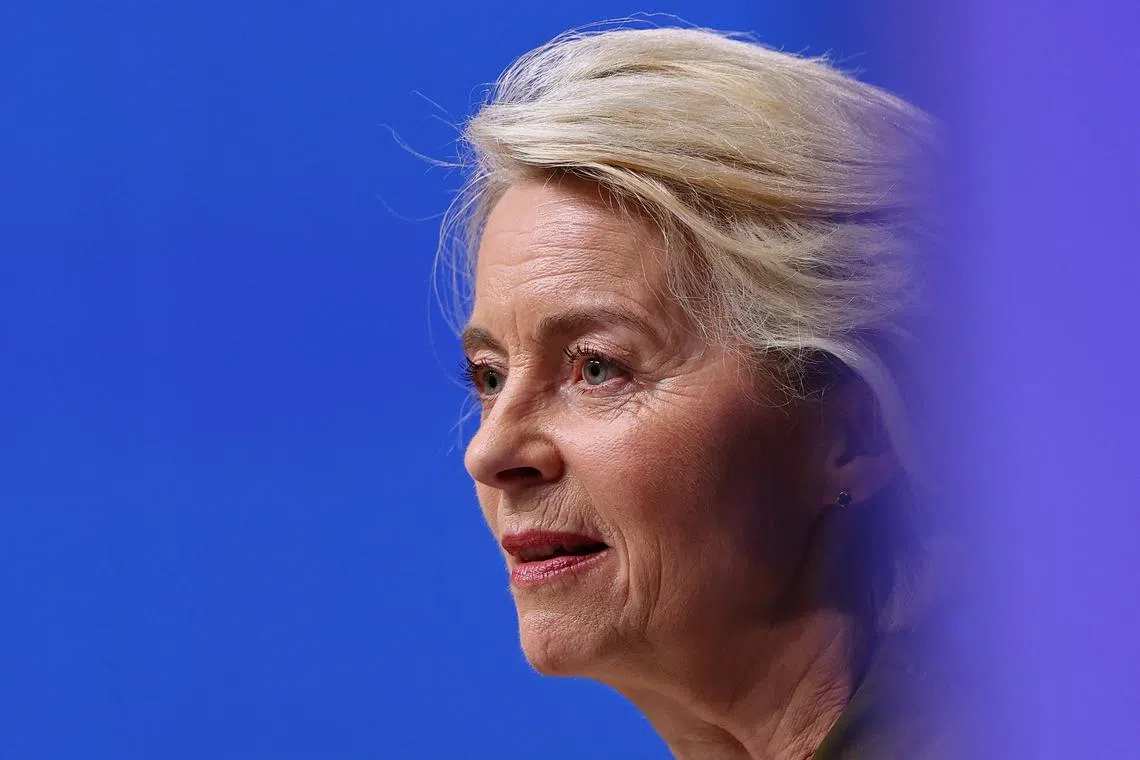Trump demands more concessions as EU holds off on US tariff countermeasures
Sign up now: Get ST's newsletters delivered to your inbox

European Commission president Ursula von der Leyen looking on during an EU-Canada summit in Brussels, Belgium, on June 23.
PHOTO: REUTERS
BRUSSELS – The European Union said on July 13 that it would extend its suspension of countermeasures to US tariffs until early August, and continue to press for a negotiated settlement as US President Donald Trump’s administration demanded more concessions from trading partners.
Mr Trump said on July 12 that he would impose a 30 per cent tariff on most imports from the EU and Mexico
White House economic adviser Kevin Hassett said on July 13 that countries’ trade deal offers so far have not satisfied Mr Trump and “the tariffs are real” without improvements.
“The President thinks that deals need to be better,” Mr Hassett told ABC’s This Week programme. “And to basically put a line in the sand, he sent these letters out to folks, and we’ll see how it works out.”
Dr Ursula von der Leyen, head of the EU’s executive commission, which handles trade policy for the 27 member states, said the bloc would maintain its two-track approach: keep talking and prepare retaliatory measures.
“We have always been very clear that we prefer a negotiated solution. This remains the case, and we will use the time that we have now,” she told a press conference, adding that the bloc would extend its halt on countermeasures until August.
Dr von der Leyen’s decision to resist immediate retaliatory measures points to the European Commission’s desire to avoid a spiralling tit-for-tat escalation in the trade war while there remains a chance of negotiating an improved outcome.
German Chancellor Friedrich Merz on July 13 said he was “really committed” to finding a trade solution with the US, telling German public broadcaster ARD that he will work intensively on this with Dr von der Leyen and French President Emmanuel Macron over the next 2½ weeks.
When asked about the impact of a 30 per cent US tariff on Germany, Mr Merz said: “If that were to happen, we would have to postpone large parts of our economic policy efforts because it would interfere with everything and hit the German export industry to the core.”
Test of unity
The latest salvo from Mr Trump and the question of how to respond may test the unity of member states, with France appearing to take a tougher line than Germany, the bloc’s industrial powerhouse whose economy leans heavily on exports.
Mr Macron said the commission needed more than ever to “assert the union’s determination to defend European interests resolutely”, and that retaliation might need to include so-called anti-coercion instruments.
German Finance Minister Lars Klingbeil said on July 13 that the EU should be ready to take firm action if talks failed.
“If a fair negotiated solution does not succeed, then we must take decisive countermeasures to protect jobs and companies in Europe,” Mr Klingbeil, who is also Vice-Chancellor in the ruling coalition, told Sueddeutsche Zeitung newspaper.
While the EU has held back from retaliating against the US in the months since Mr Trump hit the bloc with tariffs, it has readied two packages that could hit a combined €93 billion (S$139 billion) of US goods.
A first package, in response to US levies of 50 per cent on imported steel and aluminium that would hit €21 billion in US goods, was suspended in April for 90 days to allow time for negotiations. The suspension had been due to expire on July 14 before the extension was announced.
A second package in retaliation against Mr Trump’s “reciprocal” tariffs has been in the works since May and was set to target €72 billion of US goods. These measures have not been made public, and the final list requires approval by member states.
Anti-coercion instrument
Dr von der Leyen said on July 13 that the use of the EU’s anti-coercion instrument was not yet on the table.
The instrument allows the bloc to retaliate against third countries that put economic pressure on EU members to change their policies.
“The (anti-coercion) instrument is created for extraordinary situations, we are not there yet,” she said.
Possible retaliatory steps could include restricting EU market access to goods and services and other economic measures related to areas such as foreign direct investment, financial markets and export controls.
In a sign of the EU’s desire to strike deals with more trading partners at a time of deepening uncertainty in transatlantic relations, Dr von der Leyen said a political agreement had been reached to advance an EU-Indonesia trade deal.
France’s cheese producers warned of the damaging consequences of a 30 per cent tariff for the local dairy industry, which exports nearly half its produce, including to the US.
“It’s a new environment we will have to get used to – I don’t think this is temporary,” Mr Francois Xavier Huard, chief executive of dairy association FNIL, told Reuters. REUTERS


